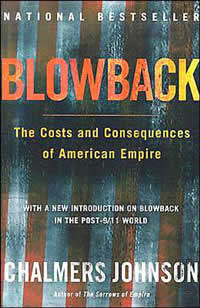Book Notes
 Chalmers Johnson, Blowback; The Costs and Consequences of American Empire (New York: Metropolitan/Owl Books, 2000, 2004), 268pp.
Chalmers Johnson, Blowback; The Costs and Consequences of American Empire (New York: Metropolitan/Owl Books, 2000, 2004), 268pp.
When Blowback was first published in the spring of 2000, about eighteen months before the 9/11 attacks, many foreign policy journals ignored it; a review in Foreign Affairs even said that it "read like a comic book." After all, Johnson's book was filled with gloomy warnings, including this one in his last few pages: "the United States will be a prime recipient in the foreseeable future of all of the more expectable forms of blowback, particularly terrorist attacks against Americans in and out of the armed forces anywhere on earth, including the United States (p. 223, my emphasis). While American critics ignored him, the international community resonated with Johnson, and the book was immediately translated into German, Italian, and Japanese. That his early critics could have been so badly wrong, and Johnson so presciently right, is symptomatic of the problems he describes, and only one indicator of the importance of this book and its two sequels, The Sorrows of Empire (2004) and Nemesis: The Last Days of the American Republic (2006).
Blowback is "another way of saying that a nation reaps what it sows." The term first appeared in a 1953 CIA document about its overthrow of the Iranian government, and described the predictable but unintended consequences of America's covert operations and foreign policies. What many people around the world "hate" about America, Johnson argues, is not our freedom and way of life, as Bush likes to say, but our global militarism and predatory economic policies which virtually assure future retaliations for decades to come. Even if most Americans are ignorant about our government's secret activities, and believe that our country's motivations are virtuous, most peoples and nations think differently and have long memories; cf., for example, Steven Kinzer's book Overthrow that documents the fourteen nations where America has toppled governments in just the last hundred years.
Johnson examines American foreign policy over the last fifty years, and the parallels between America and the demise of the Soviet Union. His special focus is Asia and the last ten years. The "peace dividend" at the end of the Cold War did not bring a period of American demilitarization, but the exact opposite. Instead of prudence, we have acted with what is now predictable condescension towards other nations and myopia about the certain consequences. Our deliberate "global military-economic dominion," and careless disregard for how the rest of the world understands our predations, are "seeding resentments that are bound to breed attempts at retaliation." Separate chapters look at Okinawa, South Korea, North Korea, China, Japan, and the 1997 economic meltdown in East Asia.
In characterizing America as a "rogue super power" Johnson is polemical but not partisan. The problems that he describes are far broader and deeper than any single administration. Given that many people around the world resent our "exploitative hegemony" as a "hopeless hypocrisy," "one must ask when, not whether, our accidental empire will start to unravel." Johnson asked that question over eight years ago. The subtitle of Nemesis (2006) gives his answer; we are already in "the last days of the American republic."


